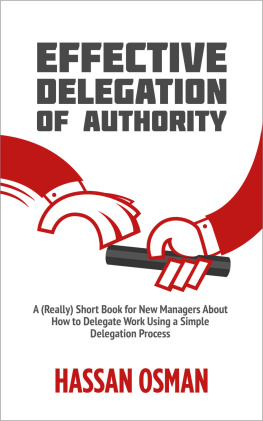50MINUTES.COM - Effective Delegation
Here you can read online 50MINUTES.COM - Effective Delegation full text of the book (entire story) in english for free. Download pdf and epub, get meaning, cover and reviews about this ebook. year: 2017, publisher: 50Minutes.com, genre: Politics. Description of the work, (preface) as well as reviews are available. Best literature library LitArk.com created for fans of good reading and offers a wide selection of genres:
Romance novel
Science fiction
Adventure
Detective
Science
History
Home and family
Prose
Art
Politics
Computer
Non-fiction
Religion
Business
Children
Humor
Choose a favorite category and find really read worthwhile books. Enjoy immersion in the world of imagination, feel the emotions of the characters or learn something new for yourself, make an fascinating discovery.
- Book:Effective Delegation
- Author:
- Publisher:50Minutes.com
- Genre:
- Year:2017
- Rating:5 / 5
- Favourites:Add to favourites
- Your mark:
- 100
- 1
- 2
- 3
- 4
- 5
Effective Delegation: summary, description and annotation
We offer to read an annotation, description, summary or preface (depends on what the author of the book "Effective Delegation" wrote himself). If you haven't found the necessary information about the book — write in the comments, we will try to find it.
Effective Delegation — read online for free the complete book (whole text) full work
Below is the text of the book, divided by pages. System saving the place of the last page read, allows you to conveniently read the book "Effective Delegation" online for free, without having to search again every time where you left off. Put a bookmark, and you can go to the page where you finished reading at any time.
Font size:
Interval:
Bookmark:



- Issue: how can I effectively entrust my colleagues with tasks and responsibilities?
- Uses: delegating tasks to your colleagues allows you to save time on a project, but also to motivate them and cultivate their talents in order to give the project the best possible chance of success.
- Professional context: project management, team management, etc.
- FAQs:
- I dont feel like I have too much work, do I still need to delegate?
- When is the right time to delegate?
- When I delegate, am I abandoning part of the project?
- Can I entrust my colleagues with any kind of tasks?
- Once a task has been delegated, do I still need to deal with it?
- What tools can help me to organise my delegating?
- What risks are linked to delegating?
- How can I make sure my coworker will accept this task positively?
- Can delegation be revoked partway through a project?
- Do I need to formalise my delegation in writing?
For many people, delegating means losing control. Out of fear of disturbing other people or a lack of confidence, or simply to ensure that a project is carried out in line with their own expectations and conditions, they try to undertake the assignment alone. However, in this situation the danger of being overwhelmed by the number of tasks to complete and of not accomplishing the goal set, or even of experiencing burnout, is never far away.
To avoid this kind of situation, a good project manager will have mastered the art of delegating effectively. Indeed, their role is not to keep a stranglehold on each component part of the project, but to oversee the project as a whole. Entrusting as many tasks as possible to other people will allow them to avoid overload and stress, which could hinder the accomplishment of the project, and to focus on the most important activities. Furthermore, delegating lets them demonstrate trust in the members of their team. The team members will feel involved, which will motivate and empower them. Everyone wins!
However, the decision to delegate should not be taken lightly or hastily, as this risks harming the project and dissuading you from delegating again. Do not be afraid to rely on your colleagues and learn the rules to follow and the behaviour to adopt towards your teammates in order to delegate without fear and successfully carry out your project.
The first thing to avoid is confusing delegation with the division of tasks, because these two processes are very different. Delegating involves entrusting one or two tasks (or objectives, because actions follow on from objectives) to one or more colleagues by making them aware of their responsibilities. It does not mean abandoning a project, losing control of it, decentralising it or losing power, but rather sharing the carrying out of the project in order to achieve a better final result.
The concept of responsibility is essential here. When you assign a task to a colleague, they must be able to enjoy some freedom to make decisions. They must be able to proceed as they want in order to reach the goal set. If they do not have this decision-making power, you will not be delegating but simply giving an order to a subordinate. However, although your colleague is responsible for accomplishing their objective, you are still responsible for the activities and decisions of the person you have delegated the task to. This is why you should have complete trust in the person you have selected and ensure some degree of monitoring to make sure that the objectives are reached.
Temporary or permanent delegation?
- Temporary delegation is the most common form of delegation. Indeed, subordinates frequently replace the superior responsible for decisions when the latter is absent, or when their services are requested because their skills are needed. In this case, the concepts of decision-making and authority are separated: the subordinate makes decisions during the delegation period, but they are not responsible for the consequences.
- Permanent delegation involves granting long-term decision-making power in certain situations which are defined beforehand. The concepts of decision-making and responsibility are linked: the colleague must therefore take responsibility for the consequences of their actions. In this case, providing for an additional clause in the colleagues contract is advised.
Delegation is influenced and facilitated by the kind of management used within the company. Management can be:
- Directive. This management style is very structured, and involves precise instructions and orders. The employee generally does not have any real decision-making power, which is not very motivating. This is not strictly speaking delegation, but rather the transmission of orders concerning a task to be carried out.
- Explanatory. This aims to mobilise employees. Orders and instructions are precise and accompanied by explanations and justifications of the decisions made. Colleagues have a low level of autonomy, which can slow down the process of project development.
- Participative. This style is based on relationships. Although it may seem somewhat disordered, it proves relatively efficient. Decisions are made in consultation with colleagues, which motivates them and encourages them to become invested in the project.
- Delegative. This kind of management, based on the managers trust in their team, relies on responsibility, independence, initiative and decision-making. Team members then feel valued and invested in the project.
Each management style has its strengths and weaknesses. The whole art of good team leadership is being able to switch from one style to another depending on the person you are dealing with and the situation. Obviously, the delegative style is best for encouraging delegation between a supervisor and their team.
Many managers have lost faith in delegation and will find a thousand excuses to avoid it: Its too much responsibility for employees, The task wont get done correctly, Explaining everything would take too long. In doing this, they quickly forget a small but vitally important detail: delegating responds to the law of division of labour. The division of labour, which was theorised by Adam Smith (British Enlightenment economist, 1723-1790), involves dividing up a single complex task into several tasks which will then be carried out by different specialists. Logically, a person focusing on a specific task will be more efficient than another person who is trying to handle several tasks. As such, through the division of labour, delegation increases productivity. It would be a shame not to make the most of it!
A project manager is not superhuman: they cannot do everything at once, as they risk not concentrating on the important tasks and making mistakes. The ability to delegate is therefore a real skill to acquire to optimise their time management and avoid being overloaded, or even overwhelmed. By entrusting tasks to their colleagues, managers can focus on tasks that are specific to their role. To do this, they must accept losing some time at the start in order to save time in the long run. This management strategy is often advised as part of burnout prevention.
Font size:
Interval:
Bookmark:
Similar books «Effective Delegation»
Look at similar books to Effective Delegation. We have selected literature similar in name and meaning in the hope of providing readers with more options to find new, interesting, not yet read works.
Discussion, reviews of the book Effective Delegation and just readers' own opinions. Leave your comments, write what you think about the work, its meaning or the main characters. Specify what exactly you liked and what you didn't like, and why you think so.















